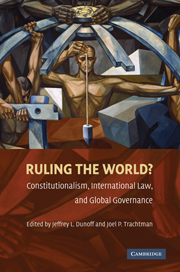Book contents
- Frontmatter
- Contents
- Contributors
- Preface: International Institutions: Why Constitutionalize?
- Acknowledgments
- PART I WHAT IS CONSTITUTIONALIZATION BEYOND THE STATE?
- PART II THE CONSTITUTIONAL DIMENSIONS OF SPECIFIC INTERNATIONAL REGIMES
- 4 The UN Charter – A Global Constitution?
- 5 Rediscovering a Forgotten Constitution: Notes on the Place of the UN Charter in the International Legal Order
- 6 Reframing EU Constitutionalism
- 7 The Politics of International Constitutions: The Curious Case of the World Trade Organization
- 8 Constitutional Economics of the World Trade Organization
- PART III CROSSCUTTING ISSUES
- Index
- References
6 - Reframing EU Constitutionalism
Published online by Cambridge University Press: 05 June 2012
- Frontmatter
- Contents
- Contributors
- Preface: International Institutions: Why Constitutionalize?
- Acknowledgments
- PART I WHAT IS CONSTITUTIONALIZATION BEYOND THE STATE?
- PART II THE CONSTITUTIONAL DIMENSIONS OF SPECIFIC INTERNATIONAL REGIMES
- 4 The UN Charter – A Global Constitution?
- 5 Rediscovering a Forgotten Constitution: Notes on the Place of the UN Charter in the International Legal Order
- 6 Reframing EU Constitutionalism
- 7 The Politics of International Constitutions: The Curious Case of the World Trade Organization
- 8 Constitutional Economics of the World Trade Organization
- PART III CROSSCUTTING ISSUES
- Index
- References
Summary
Introduction: Disputing the European Constitution
In the summer of 2007 the European Council announced its decision to “abandon” the “constitutional concept” it had endorsed so optimistically only four years previously on the occasion of receiving a draft of a first constitutional treaty for the European Union from the Convention on the Future of Europe. After the trials and tribulations of the ‘no’ votes to the 2005 French and Dutch referenda on the (duly promulgated) constitutional treaty, and in light of its dubious popularity and unratified status in some other member states, Europe's leaders finally opted to jettison the new and return to the more familiar vehicle and modest agenda of a “Reform Treaty.” This move seemed to pay a very quick political dividend, with agreement reached as early as Lisbon summit of December 2007 and implementation (in the event of successful ratification) of this new “postconstitutional Treaty” initially scheduled for the beginning of 2009. The subsequent rejection of the new Treaty by the Irish electorate in June 2008, however, disrupted that optimistic timetable and threatened the new initiative with the same fate as the old. At the time of writing, therefore, Europe's juridical future remains unresolved.
Not the least irony of the protracted and ultimately terminal difficulties encountered by the project to adopt a documentary constitution has been that they coincided with the more widespread acceptance of some kind of constitutional status for the European Union – even if this tends to be seen in “small ‘c’” rather than documentary “big ‘C’” terms.
- Type
- Chapter
- Information
- Ruling the World?Constitutionalism, International Law, and Global Governance, pp. 149 - 177Publisher: Cambridge University PressPrint publication year: 2009
References
- 10
- Cited by



